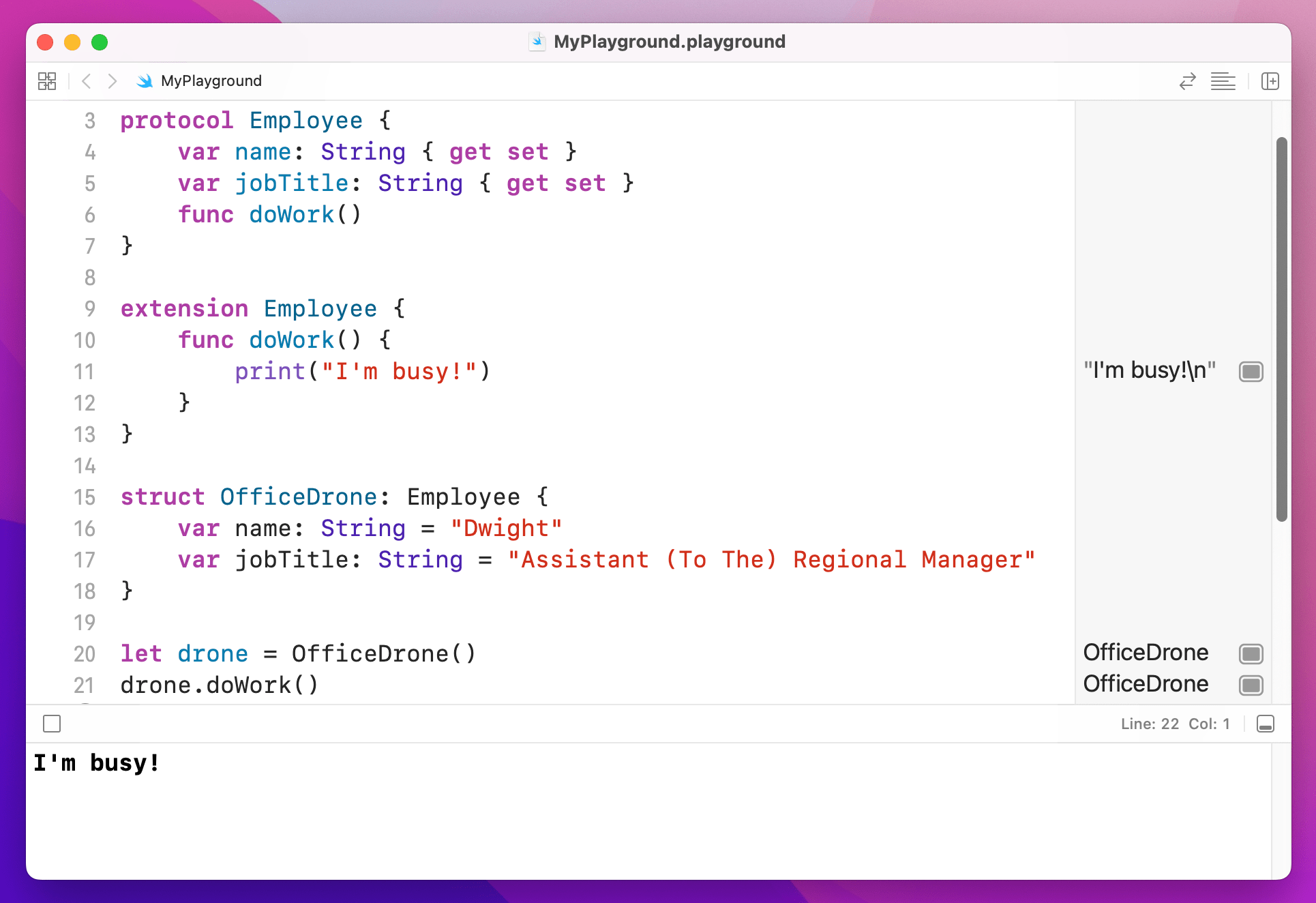Protocol extensions
Protocol extensions 관련
One of Swift’s most powerful features is its ability to extend whole swathes of data types at the same time. These are known as protocol extensions, and they are commonly used to build flexibility into large apps.
You’ve already seen how protocols let us define contracts that conforming types must adopt. Well, protocol extensions let us define implementations of things inside the protocol, adding the functionality to all types that conform to the protocol in a single place.
To demonstrate how this works, let’s look at another simple extension for the Int data type: we’re going to add a clamp() method that makes sure one number falls within the lower and upper bounds that are specified:
extension Int {
func clamp(low: Int, high: Int) -> Int {
if self > high {
// if we are higher than the upper bound, return the upper bound
return high
} else if self < low {
// if we are lower than the lower bound, return the lower bound
return low
}
// we are inside the range, so return our value
return self
}
}
let i: Int = 8
print(i.clamp(low: 0, high: 5))
Because 8 is higher than the upper bound of 5, that will print 5.
I explicitly made i an Int for a reason: there are other kinds of integers available in Swift. For example, UInt is an unsigned integer, which means it sacrifices the ability to hold negative numbers in exchange for the ability to hold much larger positive numbers.
There are also integers of different sizes, e.g. Int8 holds an integer made up of 8 binary digits, which holds a maximum value of 127, and UInt64 is the largest type of integer and holds up to 18,446,744,073,709,551,615 - that’s 18 quintillion four hundred and forty-six quadrillion in case you were wondering.
Our extension modifies the Int data type specifically, rather than all variations of integers, which means code like this won’t work because UInt64 doesn’t have the extension:
let j: UInt64 = 8
print(j.clamp(low: 0, high: 5))
Swift’s solution is to let us create protocol extensions: extensions that modify several data types at once.
You’ve already seen how the self keyword lets us refer to our current value, so self * self means “multiply my current number by itself.” Well, there’s also Self with a capital S, which has a subtly different meaning: it means “my current data type.” So, self means “my current value” and Self means “my current data type.”
This matters when it comes to extending protocols because of the way our clamp() method is declared. Take a look again:
func clamp(low: Int, high: Int) -> Int {
if self > high {
return high
} else if self < low {
return low
}
return self
}
If we want clamp() to apply to all types of integer, we can’t very well make it return Int - that’s not big enough to hold the full range of a UInt64, so Swift will refuse to build. Instead, we need to make the method return Self, which means “I’ll return whatever data type I was used with.”
Here’s the rewritten extension:
extension BinaryInteger {
func clamp(low: Self, high: Self) -> Self {
if self > high {
return high
} else if self < low {
return low
}
return self
}
}
This time I’ve made it apply to BinaryInteger, which is a protocol that all of Swift’s integer types conform to. This means all integer types get access to the clamp() method, and work as expected - we don’t need to extend them all individually.

clamp now works with UInt8, which conforms to the BinaryInteger protocol.Protocol extensions are helpful for providing default method implementations so that conforming types don’t need to implement those methods themselves unless they specifically want to.
As an example, we might define an extension for our Employee protocol so that all conforming types automatically get a doWork() method:
protocol Employee {
var name: String { get set }
var jobTitle: String { get set }
func doWork()
}
extension Employee {
func doWork() {
print("I'm busy!")
}
}

OfficeDrone can use the doWork method defined in the extension.